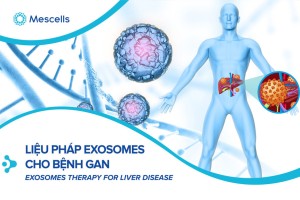1. Liệu pháp exosomes cho bệnh gan (Exosomes therapy for liver disease)
Tầm quan trọng của exosome trong sự phát triển và điều trị ung thư biểu mô tế bào gan
Li et al. Molecular Cancer (2020) 19:1
https://doi.org/10.1186/s12943-019-1085-0
REVIEW | Open Access
The significance of exosomes in the development and treatment of hepatocellular carcinoma
Xin Li¹, Chuanyun Li¹, Liping Zhang³, Min Wu¹, Ke Cao¹, Feifei Jiang¹, Dexi Chen², Ning Li¹·²* and Weihua Li²*
Tế bào gốc trung mô bảo vệ tế bào khỏi quá trình ferroptosis ở tổn thương gan cấp tính bởi exosomes nhờ sự ổn định lượng protein SLC7A11
www.nature.com/cddis
ARTICLE | OPEN
Mesenchymal stem cells protect against ferroptosis via exosome- mediated stabilization of SLC7A11 in acute liver injury
Feiyan Lin¹·²·³, Wenyi Chen¹·², Jiahang Zhou¹·², Jiaqi Zhu¹·², Qigu Yao¹·², Bing Feng¹·², Xudong Feng¹·², Xiaowei Shi¹, Qiaoling Pan¹·², Jiong Yu¹·², Lanjuan Li¹·² and Hongcui Cao ¹·²·4✉
© The Author(s) 2022
Exosomes có nguồn gốc từ tế bào gốc trung mô dây rốn của người cải thiện tổn thương gan cấp tính do IL-6 gây ra thông qua mIR-455-3p
Shao et al. Stem Cell Research & Therapy (2020) 11:37
https://doi.org/10.1186/s13287-020-1550-0
RESEARCH | Open Access
Exosomes derived from human umbilical cord mesenchymal stem cells ameliorate IL-6-Induced acute liver injury through mIR-455-3p
Mingyang Shao¹, Qing Xu¹, Zhenru Wu¹, Yuwei Chen¹, Yuke Shu¹, Xiaoyue Cao¹, Menglin Chen¹, Bo Zhang², Yongjie Zhou¹, Rong Yao³*, Yujun Shi¹·4* and Hong Bu¹·4
Exosomes có nguồn gốc từ Tế bào gốc trung mô có thể là chiến lược điều trị mới cho bệnh gan
OPEN:
Experimental & Molecular Medicine (2017) 49, e346; doi:10.1038/emm.2017.63
© 2017 KSBMB. All rights reserved 2092-6413/17
--------------------------------------------------------------------------------------------------
www.nature.com/emm
REVIEW:
Mesenchymal stem cell-derived exosomes as a new therapeutic strategy for liver diseases
Guohua Lou1,2, Zhi Chen1,2, Min Zheng1,2 and Yanning Liu1,2
The administration of mesenchymal stem cells (MSCs) as a therapy for liver disease holds great promise. MSCs can differentiate into hepatocytes, reduce liver inflammation, promote hepatic regeneration and secrete protective cytokines. However, the risks of iatrogenic tumor formation, cellular rejection and infusional toxicity in MSC transplantation remain unresolved. Accumulating evidence now suggests that a novel cell-free therapy, MSC-secreted exosomes, might constitute a compelling alternative because of their advantages over the corresponding MSCs. They are smaller and less complex than their parent cells and, thus, easier to produce and store, they are devoid of viable cells, and they present no risk of tumor formation. Moreover, they are less immunogenic than their parent cells because of their lower content in membrane-bound proteins. This paper reviews the biogenesis of MSC exosomes and their physiological functions, and highlights the specific biochemical potential of MSC-derived exosomes in restoring tissue homeostasis. In addition, we summarize the recent advances in the role of exosomes in MSC therapy for various liver diseases, including liver fibrosis, acute liver injury and hepatocellular carcinoma. This paper also discusses the potential challenges and strategies in the use of exosome-based therapies for liver disease in the future.
Experimental & Molecular Medicine (2017) 49, e346; doi:10.1038/emm.2017.63; published online 16 June 2017

